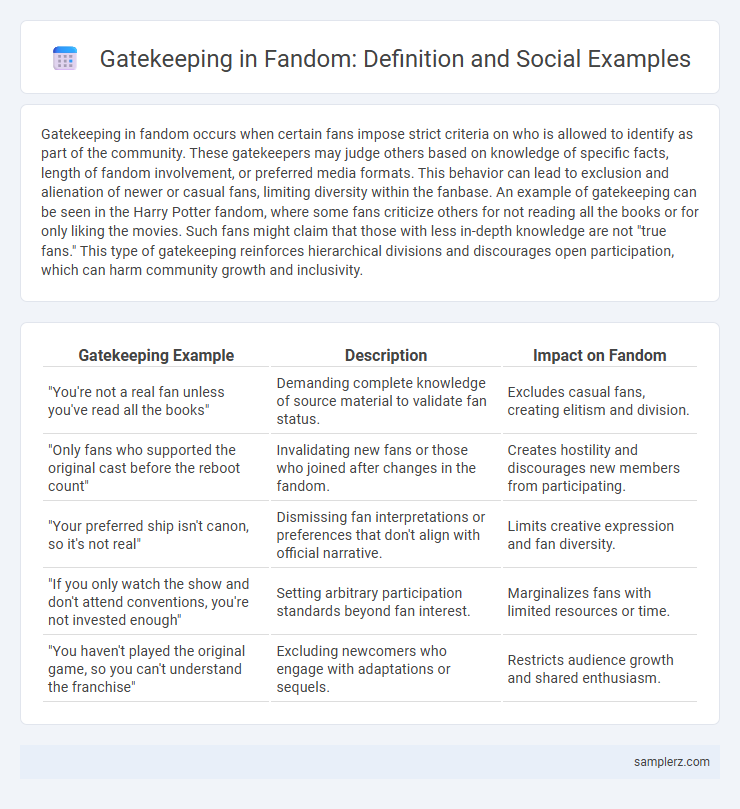Gatekeeping in fandom occurs when certain fans impose strict criteria on who is allowed to identify as part of the community. These gatekeepers may judge others based on knowledge of specific facts, length of fandom involvement, or preferred media formats. This behavior can lead to exclusion and alienation of newer or casual fans, limiting diversity within the fanbase. An example of gatekeeping can be seen in the Harry Potter fandom, where some fans criticize others for not reading all the books or for only liking the movies. Such fans might claim that those with less in-depth knowledge are not "true fans." This type of gatekeeping reinforces hierarchical divisions and discourages open participation, which can harm community growth and inclusivity.
Table of Comparison
| Gatekeeping Example | Description | Impact on Fandom |
|---|---|---|
| "You're not a real fan unless you've read all the books" | Demanding complete knowledge of source material to validate fan status. | Excludes casual fans, creating elitism and division. |
| "Only fans who supported the original cast before the reboot count" | Invalidating new fans or those who joined after changes in the fandom. | Creates hostility and discourages new members from participating. |
| "Your preferred ship isn't canon, so it's not real" | Dismissing fan interpretations or preferences that don't align with official narrative. | Limits creative expression and fan diversity. |
| "If you only watch the show and don't attend conventions, you're not invested enough" | Setting arbitrary participation standards beyond fan interest. | Marginalizes fans with limited resources or time. |
| "You haven't played the original game, so you can't understand the franchise" | Excluding newcomers who engage with adaptations or sequels. | Restricts audience growth and shared enthusiasm. |
Defining Gatekeeping in Fandom Communities
Gatekeeping in fandom communities occurs when certain members control access to or define who is a "true fan" based on arbitrary standards such as knowledge depth, length of fandom participation, or adherence to specific fan practices. This behavior limits inclusivity and can create hierarchical divisions among fans, often discouraging newcomers and diverse voices. Understanding gatekeeping is essential to fostering more welcoming and supportive fandom environments.
Classic Examples of Gatekeeping in Pop Culture Fandoms
Classic examples of gatekeeping in pop culture fandoms include demanding extensive knowledge of obscure canon details to prove legitimacy and excluding fans who prefer newer adaptations over original source material. Fans of iconic franchises like Star Wars or Doctor Who often face rigid criteria that privilege long-term dedication and insider jargon, marginalizing casual enthusiasts. This form of gatekeeping stifles diversity and creativity within fan communities by enforcing narrow definitions of authentic fandom.
Gatekeeping in Online Fan Groups
Gatekeeping in online fan groups manifests when members impose strict criteria on who qualifies as a "true fan," often excluding newcomers or casual followers from discussions and community activities. This behavior limits diversity and discourages open participation, as some fans feel pressured to conform to rigid standards based on knowledge depth, merchandise ownership, or event attendance. Such gatekeeping harms community growth by creating an unwelcoming environment that undermines the inclusive and supportive nature of fandoms.
Exclusion Based on Knowledge or Trivia
Gatekeeping in fandom often manifests through exclusion based on knowledge or trivia, where devoted fans dismiss others for lacking detailed familiarity with specific plot points or character backstories. This behavior creates barriers by valuing obscure facts over genuine enthusiasm, limiting inclusive participation. Such exclusion reinforces elitism within the community and discourages newcomers from engaging fully with the fandom.
Gender-Based Gatekeeping in Fandom Spaces
Gender-based gatekeeping in fandom spaces often manifests through the policing of who is deemed a "legitimate" fan based on gender stereotypes and biases. Female fans may face exclusion or harassment when their knowledge or passion for a genre is questioned compared to their male counterparts. This gatekeeping undermines inclusivity, perpetuates toxic fandom cultures, and restricts diverse participation in fan communities.
Gatekeeping Newcomers in Niche Fandoms
Gatekeeping newcomers in niche fandoms often manifests through exclusive jargon, insider knowledge tests, and dismissive attitudes toward casual fans. This behavior creates barriers to entry, discouraging fresh participation and limiting the growth of the community. Influential members may reinforce hierarchies by valuing long-term commitment over genuine enthusiasm, which stifles diversity and inclusivity in fandom spaces.
Impact of Gatekeeping on Fan Diversity
Gatekeeping in fandom often restricts fan diversity by enforcing rigid norms about who qualifies as a "true" fan, marginalizing newcomers and underrepresented groups. This exclusionary behavior decreases the richness of fan communities, limiting diverse perspectives and creative contributions. Consequently, gatekeeping stifles inclusivity and hampers the growth of vibrant, multifaceted fandom cultures.
Celebrity Influence and Gatekeeping Practices
Celebrity influence in fandom often manifests through gatekeeping practices that control access to fan communities and shape fan behavior. High-profile celebrities and their inner circles can set unwritten rules determining who qualifies as a "true fan," restricting participation based on knowledge, loyalty, or adherence to specific norms. These gatekeeping mechanisms reinforce power dynamics within fandoms, impacting inclusivity and the diversity of fan experiences.
Positive vs. Negative Effects of Gatekeeping
Gatekeeping in fandoms can foster a strong sense of community and preserve the authenticity of shared interests by setting standards for knowledge and participation. However, it often leads to exclusion and alienation of new or casual fans, diminishing diversity and stifling creativity within the group. Balancing gatekeeping helps maintain fan engagement without discouraging fresh perspectives or enthusiasm.
Strategies to Reduce Gatekeeping in Fandoms
Promoting inclusive community guidelines fosters a welcoming environment that discourages exclusionary behaviors in fandoms. Encouraging open dialogue and shared experiences allows diverse members to connect and reduces elitist attitudes. Implementing mentorship programs helps newcomers feel supported, minimizing gatekeeping dynamics and strengthening fandom cohesion.

example of gatekeeping in fandom Infographic
 samplerz.com
samplerz.com